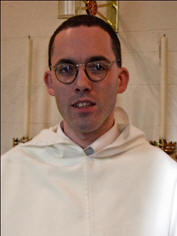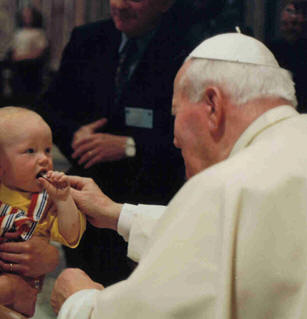Catholic Medical Quarterly Volume 67(3) August 2017
What is an Intrinsically Evil Action?
Fr Thomas Crean OP
Moral institutions and theories
 Are there some things which it's always wrong to do, regardless of the
circumstances? Most people would probably agree that there are some such
things; that it's always wrong, for example, to torture children or to
kill and eat one's parents. Such spontaneous moral judgments, that certain
types of action are wrong in themselves and can never be made right by
good intentions or unusual circumstances, form part of the “natural law”
which every man carries within himself. Just as by the God-given light of
reason we see that it is impossible that a part should ever be greater
than a whole, or that an event should have no cause, so also we see that
certain acts can never be lawful.
Are there some things which it's always wrong to do, regardless of the
circumstances? Most people would probably agree that there are some such
things; that it's always wrong, for example, to torture children or to
kill and eat one's parents. Such spontaneous moral judgments, that certain
types of action are wrong in themselves and can never be made right by
good intentions or unusual circumstances, form part of the “natural law”
which every man carries within himself. Just as by the God-given light of
reason we see that it is impossible that a part should ever be greater
than a whole, or that an event should have no cause, so also we see that
certain acts can never be lawful.
Unfortunately our natural moral light can be dimmed by sophistry, especially when supported by passions and bad examples. Two kinds of sophistry may be mentioned in particular. The first is the 'hard case'. We know by nature that it is intrinsically wrong to put an innocent man to death. But someone may say: “What if in certain circumstances one could save an entire nation by killing one innocent man? Wouldn't it then be better to put the good of many before the life of one? Indeed, wouldn't it be selfish of you to cling to your abstract moral principles and let the multitude perish?” In reply we have to insist that “intrinsic” evil means precisely that; an evil that inheres in a certain kind of act simply because of the kind of act it is, and which can't be separated from it. It is by definition wrong to choose such an act, and in hard cases we must simply say “Fiat justitia et ruant coeli” (“let justice be done though the skies should fall”), or, with St Paul, that evil must never be done that good may come (cf. Rom 3:8).
The other sophistry is more radical. It lies in defining moral good and evil in such a way that no kind of act can have either property intrinsically. Thus someone may propose that a good act is any action, regardless of its intrinsic nature, that produces good consequences: more happiness than suffering, or more happiness to better people, or higher kinds of pleasure to the largest number of people, or any other of the innumerable and impracticable criteria that philosophers have delighted to propose. On all such “consequentialist” views, it could become licit or even obligatory to murder or torture the innocent, if the right consequences were likely to follow. Such views depend upon an initial sin against the light: a defiance of the voice of conscience, which is ultimately the voice of God, telling us that not only the consequences of our actions are relevant to good and evil, but also those actions in their own nature or “species”. Conscience, unless it has been deformed, tells us that certain kinds of action simply violate that for which we were made.
A variant on this second sophistry was proposed by some people writing as Catholic theologians in recent decades. It lay in saying that the only act which is intrinsically good or evil is the act by which one determines one's attitude toward God (the so-called “fundamental option”). Thus to choose “for” God is intrinsically good, and to choose “against” Him is intrinsically bad. All other actions, these writers affirmed, would be sometimes licit and sometimes not, depending on the circumstances. This theory was perhaps worse than the pure consequentialist one, insofar as it encouraged people not only to sin, but to do so with the conviction that their relationship to God would not be seriously harmed thereby.
Church teaching
The Catholic Church affirms both that there are intrinsically evil actions, and tells us what they are. In affirming that there are such actions, she is, as we have seen, confirming a natural, human intuition. She has, however, a particular reason for her affirmation, beyond the motive of teaching a philosophical truth. For from revelation, we learn that intrinsically bad actions are not simply passing blemishes on the human soul, which might be compensated for by a sufficient number of good actions; rather, they are capable of breaking our friendship with God, and putting us into a state where we can only be rescued by His mercy. It is true that there are some actions which though intrinsically bad, are only venially so, for example indulging one's impatience. It is also true that one can sin mortally even without doing something which is intrinsically bad, for example buying a knife in order to commit murder: to buy the knife is a mortal sin by reason of one's motive, but buying knives is not in itself wrong. Nevertheless, in practice, the categories of “mortal sin” and “intrinsically bad actions” are closely connected, and where belief in the latter is obscured, people will rarely suppose themselves to have been guilty of the former. Therefore a necessary part of the Church's work of saving souls is to preserve among the faithful the awareness that certain acts are in themselves evil, bad, wrong, or disordered[1]. Such acts are also said to be wrong “'by reason of their object” and not simply, as in the case of buying a weapon for murder, wrong by reason of their end.
From the time of the apostles the Church has been warning us that certain acts exclude people from the Kingdom of Heaven. St Paul gives various lists of such sins, for example in 1 Cor 6:9-10 and Gal 5:19-21. Our Lord Himself gave such a list when He said: “From the heart come forth evil thoughts, murders, adulteries, fornications, thefts, false testimonies, blasphemies” (Matt. 15:19). In general, instruction about the commandments of God has always been part of the ordinary teaching of the bishops down the ages, infallible by reason of the ordinary and universal magisterium.
The popes have also sometimes intervened in a special manner, when the faithful were in danger of being led to believe that some kind of intrinsically bad action was lawful. Thus Benedict XIV in 1752 in the aptly-named constitution Detestabilem condemned duelling. The same pope also condemned usury. Under Benedict XV, after the first world war, the faithful were warned that it is never licit, even for the sake of scientific research, to attend a séance. Pope Pius XI taught the Church that contraception is against the law of God. Indeed, papal interventions on moral matters seem to have become more frequent in modern times: denial of the natural law has been described as the heresy of the 20th century, and things have only been getting worse in the 21st. By 1995 St John Paul II was obliged to teach in Evangelium Vitae that “euthanasia is a grave violation of the law of God” (EV 65). The same pope also taught in Donum Vitae that in-vitro fertilization is “in itself illicit and in opposition to the dignity of procreation” (DV 5).
However, in modern times, the popes have not only taught that certain kinds of acts are intrinsically wrong, but have also had to insist on the very idea of intrinsic evil, against the false theories already mentioned. In 1967, Blessed Paul VI, addressing a gathering of Redemptorists, declared:
Far be it from Christians to be led to embrace another opinion, as if the [2nd Vatican] Council taught that nowadays some things are permitted which the Church had previously declared intrinsically evil. Who does not see in this the rise of a depraved moral relativism, one that clearly endangers the Church's entire doctrinal heritage? [2]
St John Paul II
 But it was above all John Paul II who has upheld the doctrine, in
particular in the encyclical Veritatis Splendor, published in
1993. He teaches here, for example: “The negative moral precepts, those
prohibiting certain concrete actions or kinds of behaviour as
intrinsically evil, do not allow for any legitimate exception” (VS 67).
Rejecting the views then fashionable in some Catholic faculties of moral
theology, he affirmed:
But it was above all John Paul II who has upheld the doctrine, in
particular in the encyclical Veritatis Splendor, published in
1993. He teaches here, for example: “The negative moral precepts, those
prohibiting certain concrete actions or kinds of behaviour as
intrinsically evil, do not allow for any legitimate exception” (VS 67).
Rejecting the views then fashionable in some Catholic faculties of moral
theology, he affirmed:
“Man does not suffer perdition only by being unfaithful to that fundamental option whereby he has made “a free self-commitment to God”. With every freely committed mortal sin, he offends God as the giver of the law and as a result becomes guilty with regard to the entire law (cf. Jas 2:8-11); even if he perseveres in faith, he loses “sanctifying grace”, “charity” and “eternal happiness”. (VS 68)”
He writes further on:
“If acts are intrinsically evil, a good intention or particular circumstances can diminish their evil, but they cannot remove it. They remain "irremediably" evil acts; per se and in themselves they are not capable of being ordered to God and to the good of the person. “As for acts which are themselves sins (cum iam opera ipsa peccata sunt)”, Saint Augustine writes, “like theft, fornication, blasphemy, who would dare affirm that, by doing them for good motives (causis bonis), they would no longer be sins, or, what is even more absurd, that they would be sins that are justified?” (VS 81, quoting St Augstine's work, Against Lying, VII, 18)
He ends with these rather solemn words:
“Each of us can see the seriousness of what is involved, not only for individuals but also for the whole of society, with the reaffirmation of the universality and immutability of the moral commandments, particularly those which prohibit always and without exception intrinsically evil acts” (VS 115).
Fr Thomas Crean OP is a Dominican currently based at the Priory of the
Holy Cross Leicester.
He works as an assistant parish priest and as
Catholic chaplain to the Leicester Royal Infirmary.
He is also a
part-time tutor for the Maryvale Institute in Birmingham.
Footnotes
- For the purposes of this article, these terms are interchangeable.
- Address to Members of the Congregation of the Most Holy Redeemer, Acta Apostolicae Sedis 59 (1967), 962
